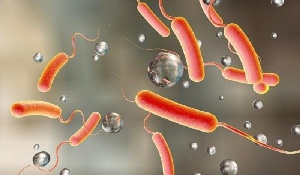The Ghana Health Service (GHS) has warned of a possible cholera outbreak in Accra with the onset of the rainy season.
It has thus urged the general public to guard against the infection by adopting safe and hygienic practices during the period to prevent an epidemic.
“We wish to alert the general public that with the onset of rains coupled with the poor sanitary conditions, we are likely to experience cholera outbreak and other infectious diseases in the region,” a statement signed by the Greater Accra Regional Director of the GHS, Dr Mrs Charity Sarpong cautioned.
It advised the public to maintain food and water safety by eating food served hot and free from dust, flies or dirt while ensuring that food preparation areas were always clean.
“Wash fruits and vegetables well with safe water before eating, cover food always, it is safe to drink bottled water and canned drinks with unbroken seals, piped water sources and sachet may not be safe for drinking and should be boiled during this season,” the statement urged.
The Directorate also advised that members of the public always wash their hands with soap under safe running water after using the toilet, before eating, feeding a baby or serving meals and after taking care of a sick person and playing.
“Keep your environment clean, do not defecate in the open, clean toilet and surfaces contaminated with faeces with disinfectant and keep uncollected rubbish covered,” it urged.
In case of contracting the disease, the statement directed individuals to immediately take oral dehydration salt (ORS) and report to the nearest health facility.
“Continue to drink the ORS while you travel to get treatment,” the statement urged.
Ghana has suffered cyclical outbreaks of cholera claiming several lives mainly due to poor environmental sanitation and hygiene conditions prevailing in the country.
Cholera is an infectious disease that causes severe watery diarrhoea, which can lead to dehydration and even death if untreated.
It is caused by eating food or drinking water contaminated with a bacterium called Vibrio cholera.
Symptoms may include watery stools, vomiting, dehydration, swollen eyes, dizziness among others.
Health News of Friday, 14 June 2019
Source: ghanaiantimes.com.gh

















